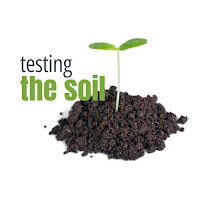Testing the Soil
"A sower went out to sow his seed. And as he sowed, some fell along the path and was trampled underfoot, and the birds of the air devoured it. And some fell on the rock, and as it grew up, it withered away, because it had no moisture. And some fell among thorns, and the thorns grew up with it and choked it. And some fell into good soil and grew and yielded a hundredfold." Luke 8.5-8a
It’s easy to confuse who we are in this parable. I’m always tempted to think of myself as the seed that grows or doesn’t grow. But in this parable the people are not the seed. Rather, "The seed is the word of God” (Lk. 8.11b). It is the word of God that the sower plants, and it is the word of God that is meant to grow and prosper. We are "those who hear" the word. Our hearts are the soil where it is expected to take root and grow (8:14-15). But, according to Jesus, there are four kinds of soil, and not all of them are suited to the word of God.
"The ones along the path are those who have heard; then the devil comes and takes away the word from their hearts, so that they may not believe and be saved" (8:12). These souls are packed hard, so self-satisfied that they are impenetrable. Oblivious to their sin and untroubled by it, God’s word can fall on them all day long and never penetrate the surface.
It’s tempting to identify the “path” as the unbelieving hearts of those folks who never set foot in church. But in Jesus’s day, those well-trod paths were the hearts of the religious leaders—the “church people” who spent their lives giving lip-service to their devotion to Scripture while refusing to allow it access to the sin in their own hearts. These hearts are experts in missing the point or in applying it to everyone but themselves. Thus every single word is snatched up before sinking a single root.
"[T]he ones on the rock are those who, when they hear the word, receive it with joy. But these have no root; they believe for a while, and in time of testing fall away" (8:13). The rocky soil is hard, but in a different way than the path. The word falls easily into its cracks and it quickly begins to grow. But when following Christ gets hard—which it inevitably does—the roots of the word find nowhere to go. It shrivels and dies.
"And as for what fell among the thorns, they are those who hear, but as they go on their way they are choked by the cares and riches and pleasures of life, and their fruit does not mature" (8:14). When the word of God lands in this soil, it finds lots of competition. This heart readily yields its energies to every worry and every pleasure this world has to offer. Any hand that seeks to clear the weeds is pricked by thorns. So the word is left to choke to death.
"As for that in the good soil, they are those who, hearing the word, hold it fast in an honest and good heart, and bear fruit with patience" (8:15). The good soil is the heart that lets God’s word in and yields to it. It is a heart that responds to conviction with repentance and a heart that continues to make more and more room for the word of God to grow.
Thus, Jesus tells us, the word of God exposes the state of our hearts. This is why, "as he said these things, he called out, 'He who has ears to hear, let him hear.'" And this is why he tells us to "Take care then how you hear, for to the one who has, more will be given, and from the one who has not, even what he thinks that he has will be taken away." (8:18).
My friends, let’s all be careful how we hear.
(This article was originally published here.)



Comments